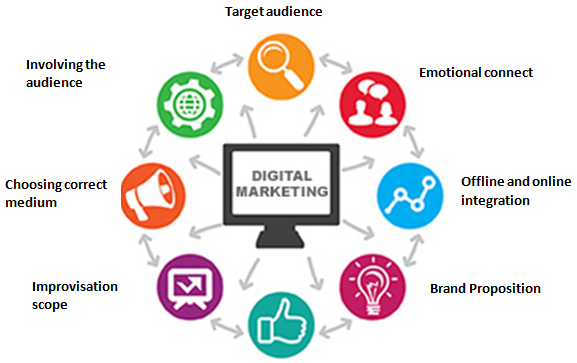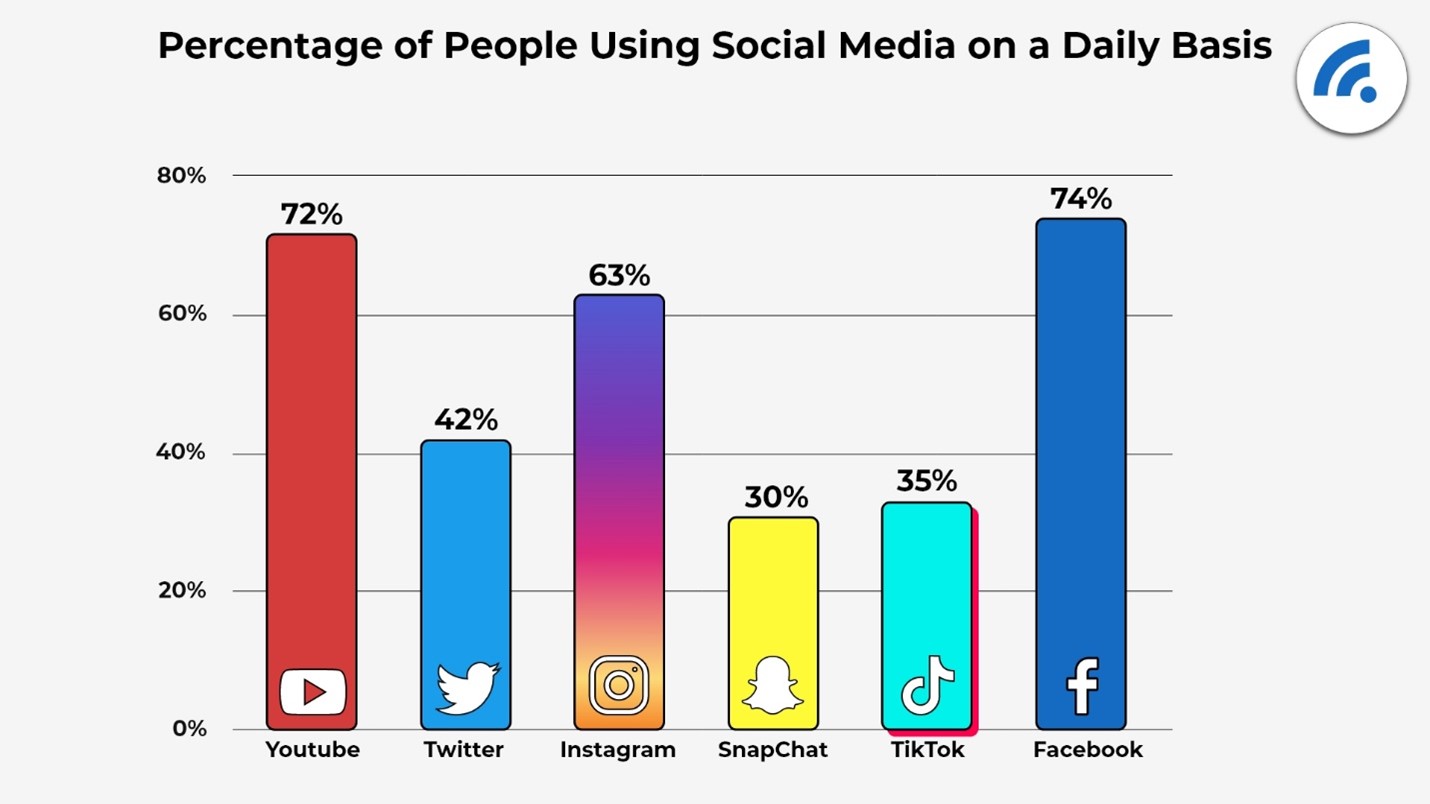Digital marketing is one of the most effective ways to expand your business online, regardless of the size of your company or industry. However, you must choose a strategy that is both relevant and suitable for your company. In this post, we will be covering the most popular digital marketing strategies that can help you scale up your business and increase sales.
Page Contents:
What is a Digital Marketing Strategy?
A digital marketing strategy helps in accomplishing business objectives and goals through online mediums such as social media, email marketing, search engine optimization, etc. It is basically a plan that outlines how your business will achieve its goals and aims.
Importance of Digital Marketing Strategies
Deploying digital marketing methods enables you to construct a more cohesive, customer-oriented program that promotes brand recognition. These programs foster brand loyalty leading to better sales and increased business revenue. Some of its advantages include:
Drive more traffic to the site: One of the primary goals of a digital marketing strategy is to drive more traffic to the website. By implementing digital marketing strategies, it gets much easier to generate leads, conversions and sales.
Provides direction to your goal: Adopting a digital marketing technique enables you to clearly define your goals which helps in planning and achieving your business goals in an easy and effortless manner.
Builds brand awareness: Digital marketing strategy allows you to reach a mass audience and connect with customers on a deeper level. You get to showcase your brand in front of a large crowd which leads to promoting your brand and building awareness.
Increases business revenue: Every company has the goal to increase sales and business revenue. Choosing the right digital marketing strategy helps you reach your goals much faster.
How to select a digital marketing strategy for your business?
Before choosing a strategy, it is crucial to analyze your current business requirements, future business goals and create a suitable plan of action to make the best choice. Here, are the steps that can help you select the right digital marketing strategy for your business.
Create a plan: The success of a digital marketing strategy begins with a successful plan. You can analyze brand voice, unique selling points (USPs), and value proposition to structure the right plan for your business.
Determine your target audience: Decide which audience you want to cater to. You can evaluate the demographics, purchase history, buying behavior before making the decision.
Set goals: Set specific, measurable, achievable, realistic and timely goals to guide you in the right direction. Prepare both the short and long-term goals as per your business vision and mission.
Take action: Set a realistic budget for your business advertising. Take suitable action towards the completion of your goals. Example, if you are investing in promotion, calculate your ad expenses, if you are publishing blogposts, prepare a calendar with the schedule and time for your posts.
Track your progress: Measure the performance of your campaign using tools like Google Analytics, Google Search Console, Google Ads and others.
Types of Digital Marketing Strategies
Social Media Platforms
Consumers in today’s digital era spend most of their time on social networking platforms. Social media offers a great way to advertise products and reach a large consumer base. Numerous studies have shown that people that follow your brand on social media are more likely to purchase your products and services.
Engaging customers via social media platforms is one of the best ways to cultivate brand awareness and build customer loyalty. The objective of social media marketing is to promote brand awareness and improve company’s reputation.
The following research studies have proven the rising trend of social media websites:
- On average users have access to 8 social media accounts.
- A person approximately spends 2 hours browsing social media sites.
- 26 billion people access social media via their phones.
- On average people spend 1/7th of their waking time on social media sites.
Influencer Marketing
When a brand collaborates and partners with celebrities, famous personalities and experts in a particular field, it is known as Influencer Marketing. 9 out of 10 brands have found success with influencer marketing and considered it as the best channel for promotion. Several surveys have revealed that 1 out of 2 women made a purchase decision on the recommendation by the influencer. Statistics related to Influencer Marketing are as follows:
- 17% of companies spend over half of their marketing budget on influencers.
- Marketers will increase their spending on influencers by 2023.
- Brands Spend More Than $100 per Influencer-Generated content.
Email Marketing
Organizations have found email marketing campaigns a profitable marketing strategy to stay connected with potential customers on a regular basis. Transactional emails are more likely to be opened by consumers. Studies have shown that 60% of consumers feel that email plays a major role in their purchase decisions.
Emails marketing is one of the best ways to build brand awareness and encourage repeat purchases. One of the major advantages of using this method is it enables you to segment your audience and send personalized emails to each customer. Email marketing statistics are shown as follows:
- 80% of companies utilize email marketing.
- Email marketing accounts for an average ROI of $44 for every $1 invested.
- Creates 50% more sales than other lead generation strategies.
Content Marketing
Content Marketing is found to be less expensive than other marketing mediums. This platform focuses on connecting and engaging consumers via content. The content can be in the form of videos, blogposts, infographics and more. It is important to create original and high-quality content that has the potential to garner attention from the users.
The objective of content marketing strategy is to deliver value and provide useful information to the target customer base. Moreover, this tool also aims to optimize content for search engines for improving your visibility in the SERPs. Statistics related to content marketing are as follows:
- Content marketing costs 62% less than traditional marketing methods.
- It generates 54% more leads than traditional marketing mediums.
- More than 60% of users prefer companies that create content.
Search Engine Optimization
SEO is the practice of improving the ranking of webpage for keywords and phrases related to your business. The main objective of SEO is to direct traffic to your site and increase click-through-rate.
SEO is one of the most effective digital marketing strategies that can be incorporated by all kinds of businesses. As every user begins their search from a search engine, SEO is ideal for all kinds of business promotions. Some of the research findings supporting SEO are:
- 80% of consumers do product research online.
- More than half of users discover a new company or product on Google’s SERPs.
- Less than 10% of searches visit the second page of search results.
- More than 30% of searchers click on the first result.
Pay-per-click
Pay-per-click is a form of advertising medium that allows businesses to purchase traffic to their website. Marketers put ads on search engines like Google and pay every time the ad is clicked on. When a user clicks on an ad, they will be directed to the landing page of your site and see a call-to-action (CTA) to convert either by purchasing a product or any other action.
They appear on top of the SERPs above organic listings and are determined by bids on particular keywords. The objective of PPC ad is to reach searchers with transactional queries. Statistics related to PPC are as follows:
- Businesses earn $8 for every $1 spent on Google Ads.
- Users who click on PPC ads are 50% more likely to buy a product or service.
Affiliate Marketing
Affiliate Marketing is a process in which affiliate promotes products and services of a brand in return for a commission on each sale. It is also known as performance-based marketing. Basically, this marketing module helps in promoting your business and boosting brand awareness.
The more people promote your brand, the higher is the chances of gaining new customers and increasing sales. The commission amount may vary from company to company. Affiliates get paid for each sale, click or lead.
Some of the statistics related to Affiliate Marketing are:
- 81% of brands use affiliate marketing to capture customers’ attention and generate more sales.
- 79% of marketers utilize affiliate marketing to maximize conversions and increase sales.
- 83% of marketers incorporate affiliate marketing to build brand awareness.
Mobile Marketing
The importance of mobile marketing will continue to accelerate as it is predicted by 2024, the number of mobile shoppers will rise to 187.5 million users. Mobile marketing is promoting your business on mobile devices using channels such as SMS, push and in-app notifications.
Using mobile marketing, businesses can connect with customers on a personal level by sending customized, time and location-specific information. As more and more users are spending the majority of their time on their cell phones, mobile marketing is here to stay.
Some mobile marketing statistics are as follows:
- Mobile searches have increased 200% every year.
- 80% of mobile device time is spent on apps.
- 79% of smartphone users have their phones near them.
- There are 8.7 billion mobile devices in the world.
An effective digital marketing plan lays out the steps necessary to achieve lucrative results. The key to reaching your company objectives is to implement the right strategy. Depending on your existing and future business vision, resources, target audience, and budget, you can choose any plan that works for you. Start implementing these strategies to help your company scale up, acquire and retain customers, and increase revenue. Visit Serpok for more information.


